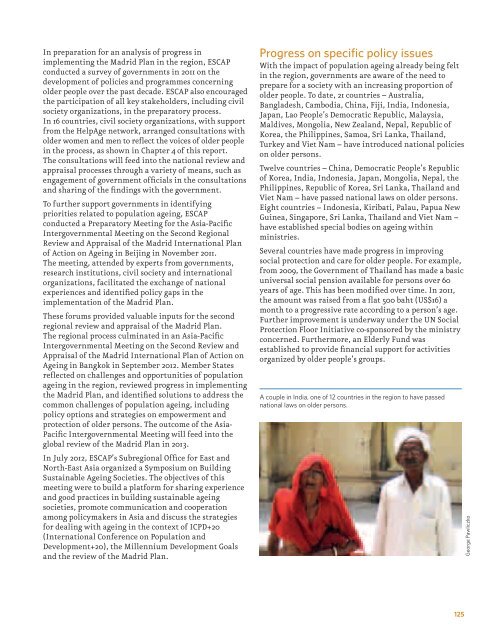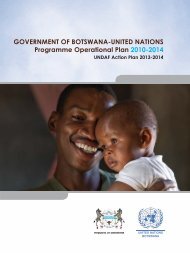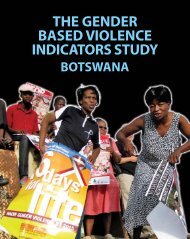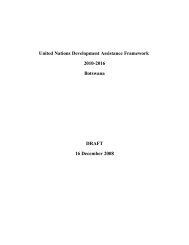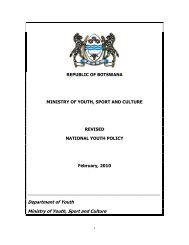Ageing in the Twenty-First Century: - HelpAge International
Ageing in the Twenty-First Century: - HelpAge International
Ageing in the Twenty-First Century: - HelpAge International
You also want an ePaper? Increase the reach of your titles
YUMPU automatically turns print PDFs into web optimized ePapers that Google loves.
In preparation for an analysis of progress <strong>in</strong><br />
implement<strong>in</strong>g <strong>the</strong> Madrid Plan <strong>in</strong> <strong>the</strong> region, ESCAP<br />
conducted a survey of governments <strong>in</strong> 2011 on <strong>the</strong><br />
development of policies and programmes concern<strong>in</strong>g<br />
older people over <strong>the</strong> past decade. ESCAP also encouraged<br />
<strong>the</strong> participation of all key stakeholders, <strong>in</strong>clud<strong>in</strong>g civil<br />
society organizations, <strong>in</strong> <strong>the</strong> preparatory process.<br />
In 16 countries, civil society organizations, with support<br />
from <strong>the</strong> <strong>HelpAge</strong> network, arranged consultations with<br />
older women and men to reflect <strong>the</strong> voices of older people<br />
<strong>in</strong> <strong>the</strong> process, as shown <strong>in</strong> Chapter 4 of this report.<br />
The consultations will feed <strong>in</strong>to <strong>the</strong> national review and<br />
appraisal processes through a variety of means, such as<br />
engagement of government officials <strong>in</strong> <strong>the</strong> consultations<br />
and shar<strong>in</strong>g of <strong>the</strong> f<strong>in</strong>d<strong>in</strong>gs with <strong>the</strong> government.<br />
To fur<strong>the</strong>r support governments <strong>in</strong> identify<strong>in</strong>g<br />
priorities related to population age<strong>in</strong>g, ESCAP<br />
conducted a Preparatory Meet<strong>in</strong>g for <strong>the</strong> Asia-Pacific<br />
Intergovernmental Meet<strong>in</strong>g on <strong>the</strong> Second Regional<br />
Review and Appraisal of <strong>the</strong> Madrid <strong>International</strong> Plan<br />
of Action on <strong>Age<strong>in</strong>g</strong> <strong>in</strong> Beij<strong>in</strong>g <strong>in</strong> November 2011.<br />
The meet<strong>in</strong>g, attended by experts from governments,<br />
research <strong>in</strong>stitutions, civil society and <strong>in</strong>ternational<br />
organizations, facilitated <strong>the</strong> exchange of national<br />
experiences and identified policy gaps <strong>in</strong> <strong>the</strong><br />
implementation of <strong>the</strong> Madrid Plan.<br />
These forums provided valuable <strong>in</strong>puts for <strong>the</strong> second<br />
regional review and appraisal of <strong>the</strong> Madrid Plan.<br />
The regional process culm<strong>in</strong>ated <strong>in</strong> an Asia-Pacific<br />
Intergovernmental Meet<strong>in</strong>g on <strong>the</strong> Second Review and<br />
Appraisal of <strong>the</strong> Madrid <strong>International</strong> Plan of Action on<br />
<strong>Age<strong>in</strong>g</strong> <strong>in</strong> Bangkok <strong>in</strong> September 2012. Member States<br />
reflected on challenges and opportunities of population<br />
age<strong>in</strong>g <strong>in</strong> <strong>the</strong> region, reviewed progress <strong>in</strong> implement<strong>in</strong>g<br />
<strong>the</strong> Madrid Plan, and identified solutions to address <strong>the</strong><br />
common challenges of population age<strong>in</strong>g, <strong>in</strong>clud<strong>in</strong>g<br />
policy options and strategies on empowerment and<br />
protection of older persons. The outcome of <strong>the</strong> Asia-<br />
Pacific Intergovernmental Meet<strong>in</strong>g will feed <strong>in</strong>to <strong>the</strong><br />
global review of <strong>the</strong> Madrid Plan <strong>in</strong> 2013.<br />
In July 2012, ESCAP’s Subregional Office for East and<br />
North-East Asia organized a Symposium on Build<strong>in</strong>g<br />
Susta<strong>in</strong>able <strong>Age<strong>in</strong>g</strong> Societies. The objectives of this<br />
meet<strong>in</strong>g were to build a platform for shar<strong>in</strong>g experience<br />
and good practices <strong>in</strong> build<strong>in</strong>g susta<strong>in</strong>able age<strong>in</strong>g<br />
societies, promote communication and cooperation<br />
among policymakers <strong>in</strong> Asia and discuss <strong>the</strong> strategies<br />
for deal<strong>in</strong>g with age<strong>in</strong>g <strong>in</strong> <strong>the</strong> context of ICPD+20<br />
(<strong>International</strong> Conference on Population and<br />
Development+20), <strong>the</strong> Millennium Development Goals<br />
and <strong>the</strong> review of <strong>the</strong> Madrid Plan.<br />
Progress on specific policy issues<br />
With <strong>the</strong> impact of population age<strong>in</strong>g already be<strong>in</strong>g felt<br />
<strong>in</strong> <strong>the</strong> region, governments are aware of <strong>the</strong> need to<br />
prepare for a society with an <strong>in</strong>creas<strong>in</strong>g proportion of<br />
older people. To date, 21 countries – Australia,<br />
Bangladesh, Cambodia, Ch<strong>in</strong>a, Fiji, India, Indonesia,<br />
Japan, Lao People’s Democratic Republic, Malaysia,<br />
Maldives, Mongolia, New Zealand, Nepal, Republic of<br />
Korea, <strong>the</strong> Philipp<strong>in</strong>es, Samoa, Sri Lanka, Thailand,<br />
Turkey and Viet Nam – have <strong>in</strong>troduced national policies<br />
on older persons.<br />
Twelve countries – Ch<strong>in</strong>a, Democratic People’s Republic<br />
of Korea, India, Indonesia, Japan, Mongolia, Nepal, <strong>the</strong><br />
Philipp<strong>in</strong>es, Republic of Korea, Sri Lanka, Thailand and<br />
Viet Nam – have passed national laws on older persons.<br />
Eight countries – Indonesia, Kiribati, Palau, Papua New<br />
Gu<strong>in</strong>ea, S<strong>in</strong>gapore, Sri Lanka, Thailand and Viet Nam –<br />
have established special bodies on age<strong>in</strong>g with<strong>in</strong><br />
m<strong>in</strong>istries.<br />
Several countries have made progress <strong>in</strong> improv<strong>in</strong>g<br />
social protection and care for older people. For example,<br />
from 2009, <strong>the</strong> Government of Thailand has made a basic<br />
universal social pension available for persons over 60<br />
years of age. This has been modified over time. In 2011,<br />
<strong>the</strong> amount was raised from a flat 500 baht (US$16) a<br />
month to a progressive rate accord<strong>in</strong>g to a person’s age.<br />
Fur<strong>the</strong>r improvement is underway under <strong>the</strong> UN Social<br />
Protection Floor Initiative co-sponsored by <strong>the</strong> m<strong>in</strong>istry<br />
concerned. Fur<strong>the</strong>rmore, an Elderly Fund was<br />
established to provide f<strong>in</strong>ancial support for activities<br />
organized by older people’s groups.<br />
A couple <strong>in</strong> India, one of 12 countries <strong>in</strong> <strong>the</strong> region to have passed<br />
national laws on older persons.<br />
George Pawliczko<br />
125


